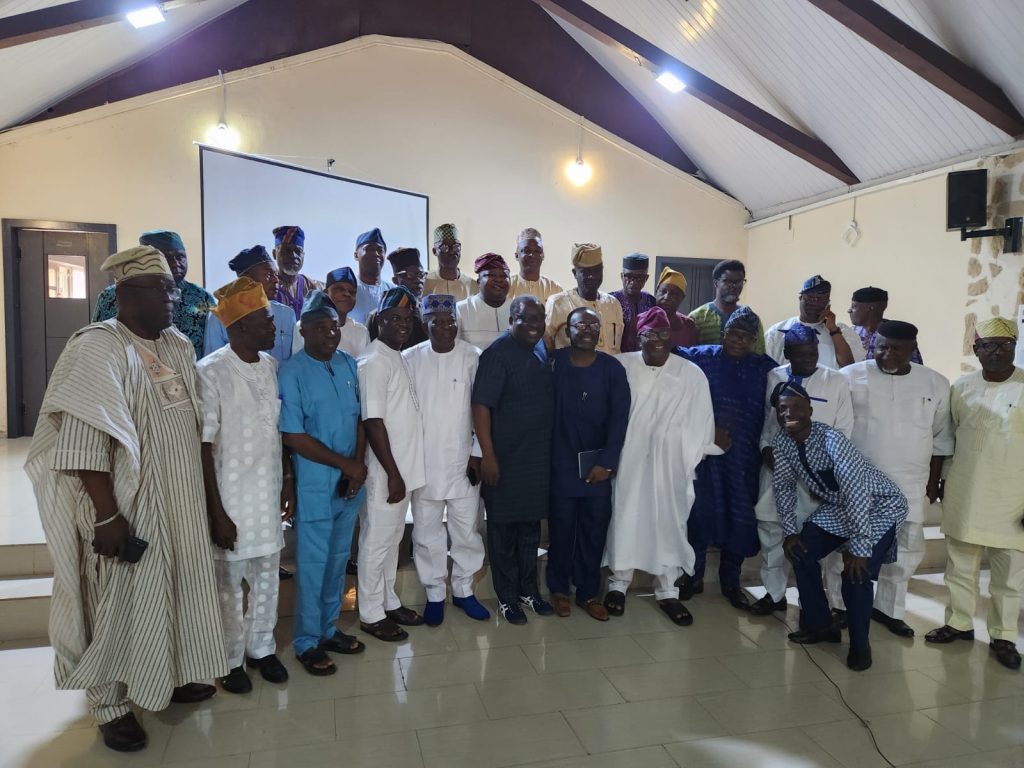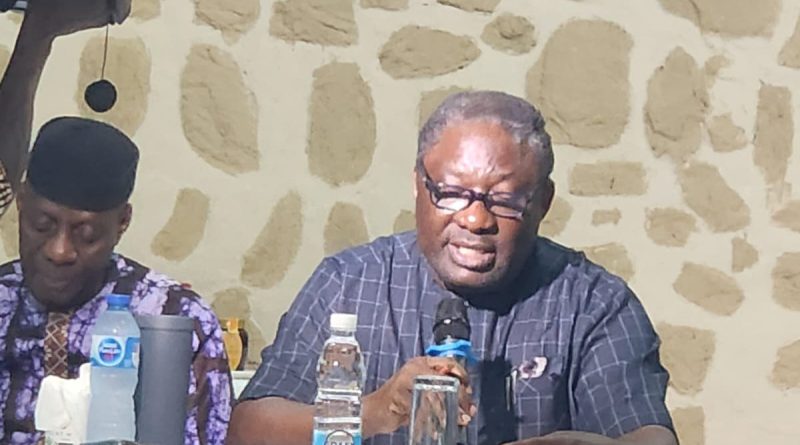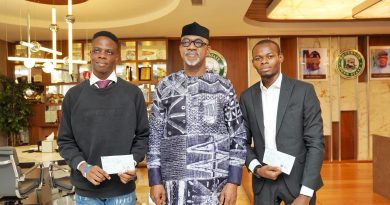Crafting An Agenda Of Prosperity For The Southwest Today, Tomorrow And Beyond
“Looking beyond, the Region’s global exposure will translate into increased influence on the world stage. Its cultural and intellectual contributions will enrich global dialogues, while its economic and political engagements will strengthen international relations”
By Senator Tokunbo Afikuyomi
Thank you for the gracious invitation to deliver the keynote address at this significant gathering focused on crafting an agenda of prosperity for the Southwest. It is both an honour and a privilege to be part of this esteemed event, where leaders, thinkers, and stakeholders from various sectors have come together with a shared vision of driving sustainable development and growth in our beloved region. The Southwest with its rich history, cultural heritage, and economic potential, stands at a critical juncture, and the discussions we will have today are pivotal in shaping the future trajectory of this region.
As we embark on this discourse, it is essential to recognise the opportunities and challenges that lie ahead. Today’s deliberations are not just about addressing the immediate needs of the present but also about laying a strong foundation for a prosperous tomorrow and beyond. Our collective efforts in this forum will contribute to a strategic roadmap that ensures inclusive growth, economic
diversification, and the empowerment of all citizens in the Southwest. I am confident that the ideas and strategies we develop here will resonate far beyond these walls, setting the stage for a brighter and more prosperous future for generations to come.

The agenda begins with a focus on enhancing economic diversification. In the present, it is essential to invest in key sectors such as agriculture, technology, and manufacturing to reduce the region’s reliance on oil revenues.
This effort should include supporting Small and Medium-Sized Enterprises (SMEs) by providing them with access to finance, infrastructure, and capacity-building opportunities. Looking to the future, fostering innovation hubs and industrial
parks will be crucial to promoting entrepreneurship and job creation.
Partnerships between academia, industry, and government must be encouraged to drive research and development in emerging sectors. Ultimately, the goal is to establish the Southwestern region as a global player in technology, agribusiness, and creative industries by leveraging local resources and talent to compete on the international stage.
Strengthening infrastructure development is another critical component of this agenda. Today,
the priority should be on the development and maintenance of essential infrastructure, including transportation networks, energy supply, and water resources, with an emphasis on equitable distribution across both urban and rural areas. As the region advances, expanding infrastructure to meet the demands of growing urbanization and industrialisation will be necessary. Implementing smart city initiatives will improve urban living conditions and sustainability. In the long term, achieving world-class infrastructure standards that support the region’s economic activities will enhance the quality of life and attract foreign direct investment.
Promoting education and human capital development is also key to the region’s prosperity.
Investments should be made in primary and secondary education to ensure basic literacy and numeracy, while vocational and technical training programs should be strengthened to equip the youth with employable skills. In the near future,
expanding access to higher education and promoting research in science, technology, engineering, and mathematics (STEM) fields will be essential. Encouraging lifelong learning and continuous professional development will help
cultivate a knowledge-driven economy where education and innovation are the cornerstones of prosperity. This will produce globally competitive talent and thought leaders from the region.
Fostering good governance and institutional reforms is equally important. Today, efforts
should focus on promoting transparency, accountability, and anti-corruption measures within government institutions. Strengthening the rule of law and ensuring the effective use of public resources are crucial steps. In the coming years, implementing reforms to enhance the efficiency of public services and governance structures will be necessary. Citizen participation in decision-making processes at all levels of government should be encouraged. The long-term objective is to build resilient institutions that can withstand
political and economic pressures, ensuring long-term stability and prosperity for the region.
Social inclusion and poverty reduction are also central to this agenda. Today, social protection programs aimed at reducing poverty and inequality should be implemented, with targeted support provided to vulnerable populations such as women, children, and the elderly. Tomorrow, inclusive policies that address the root causes of poverty, such as lack of access to education, healthcare, and economic opportunities, should be created. Promoting gender equality and
empowering marginalized communities will be key. The ultimate goal is to achieve a socially inclusive society where all citizens have equal access to opportunities and resources, contributing to a cohesive and prosperous region.
Advancing environmental sustainability is another priority. Currently, promoting sustainable agricultural practices and environmental conservation efforts to protect the region’s natural resources is critical. Addressing issues related to waste management and pollution should also be a focus. In the future, developing and implementing green energy initiatives, such as solar and wind power, will help reduce the region’s carbon footprint. Integrating climate
resilience into regional planning and development will ensure long-term sustainability. The long-term vision is to establish the Southwestern region as
a leader in environmental sustainability, with a strong commitment to preserving natural resources for future generations.
Strengthening regional cooperation and integration is vital for the region’s prosperity.
Today, fostering collaboration among Southwestern states on shared challenges
and opportunities should be prioritized. Promoting inter-state trade and economic cooperation will help create a unified economic front. In the future, establishing a regional economic bloc that leverages the unique strengths of each state for collective prosperity will be important. Developing cross-border
infrastructure and policy frameworks that facilitate regional integration will further enhance cooperation. The long-term goal is to position the Southwestern region as a model of regional cooperation in Nigeria, leading to increased
political influence, economic power, and cultural exchange both within and beyond the country.
Creating an agenda for the Southwest is crucial within the broader context of the nation for several compelling reasons. The Southwestern Region, which includes states such as Lagos, Ogun, Oyo, Osun, Ondo, and Ekiti, has historically been a hub of political leadership, economic development, and cultural advancement in
Nigeria. Establishing a clear agenda helps sustain this legacy and ensures the region remains a significant player in the national discourse.
The Southwest is a major economic powerhouse in Nigeria, with Lagos serving as the commercial capital of the country. A focused agenda on economic empowerment, industrial growth, and innovation will drive sustainable development, reduce poverty, and enhance the region’s contribution to the national economy. This is
essential for maintaining and expanding its economic leadership.
The region has also been a leader in education, housing some of Nigeria’s foremost universities and research institutions. Prioritizing education, research, and technological innovation in the agenda will ensure the region continues to
produce a skilled workforce capable of competing globally and contributing to Nigeria’s knowledge economy. Culturally, the Southwest is rich, with the Yoruba ethnic group playing a predominant role. An agenda that emphasises cultural
preservation, tourism, and the promotion of Yoruba heritage can strengthen the region’s identity and unity, while attracting global interest and investment in cultural tourism.
To support economic growth, it is vital to prioritize infrastructure development, including improvements in transportation, healthcare, and digital connectivity. Enhanced infrastructure will benefit the region by facilitating trade, movement
of goods, and access to services, thereby contributing to national development. A well-defined agenda can also help the region establish and maintain political stability by ensuring good governance, transparency, and accountability. This is crucial for fostering trust among the populace and for ensuring that the region continues to play a leading role in Nigeria’s political landscape.
Given Nigeria’s security challenges, including insurgency, banditry, and kidnapping, the Southwestern Region must have a security agenda that focuses on regional cooperation, intelligence sharing, and community policing. This approach is essential for ensuring the safety of citizens and sustaining economic activities. With a significant youth population, the region needs an agenda that focuses on youth empowerment, job creation, and social inclusion. Addressing these areas will harness the potential of the youth, reduce unemployment, and tackle social inequalities, contributing to overall national stability.
Environmental challenges such as coastal erosion, flooding, and deforestation also need attention. An agenda incorporating environmental sustainability will ensure the preservation of the region’s natural resources for future generations while addressing the immediate impacts of climate change. An agenda for the Southwestern Region should not only tackle current challenges but also anticipate future trends and opportunities. This includes visionary planning in
areas such as smart cities, renewable energy, and the digital economy, ensuring that the region remains competitive and relevant in a rapidly changing world.
The Region is integral not only to the region itself but also to the broader success of Nigeria. By addressing key areas such as economic development, education, infrastructure, security, and governance, the Region can continue to play a pivotal role in shaping the future of the nation. This agenda will serve as a blueprint for sustainable growth, social cohesion, and long-term prosperity, benefiting both the region and Nigeria as a whole.
Envisioning the future of the Southwest involves imagining a landscape that builds upon its current strengths and addresses its challenges with strategic foresight. Today, the Southwestern Region is a beacon of sophistication, notable for its advancements in education, diplomacy, business, politics, and governance. Its
educational institutions are among the most reputable in Nigeria, serving as hubs of innovation and intellectual growth. The region’s involvement in diplomacy and global affairs further underscores its role as a critical player on the international stage, facilitating cross-border collaborations and fostering international partnerships.
Looking towards tomorrow, the Region is poised to leverage its educational prowess to drive even greater advancements. Its universities and research institutions will continue to contribute significantly to technological and scientific
breakthroughs, nurturing a new generation of leaders and innovators. The business landscape will expand, with the region positioning itself as a major economic powerhouse, attracting both domestic and international investments.
This economic vitality will be supported by strategic policies that enhance infrastructure, promote entrepreneurship, and ensure sustainable development.
In the political and governance arenas, the region is likely to lead by example, setting high standards for transparency, accountability, and participatory
governance. The integration of modern technologies and innovative practices in
governance will streamline processes, reduce corruption, and enhance public service delivery. Politically, the Region will continue to exert influence, shaping national policies and contributing to the stability and progress of Nigeria as a whole.
Looking beyond, the Region’s global exposure will translate into increased influence on the world stage. Its cultural and intellectual contributions will enrich global dialogues, while its economic and political engagements will strengthen
international relations. The region will harness its unique strengths to address global challenges, from climate change to economic disparities,
positioning itself as a key player in shaping the future of global governance and cooperation.
In essence, the future of the Southwest is one of dynamic growth and leadership. It will build upon its current achievements to create a prosperous and influential presence both within Nigeria and globally. As it continues to evolve, the region will undoubtedly serve as a model of development,
resilience, and innovation for others to emulate.
As we stand at this pivotal moment in the evolution of the Southwest is imperative to
crystallise the vision and strategies that will define its future. The collective insights and discussions at this gathering offer a blueprint for transforming aspirations into tangible outcomes, and our commitment to this agenda will determine the region’s trajectory in the years to come.
Today, the Region embodies a rich legacy of cultural, educational, and economic prominence. The roadmap we chart must not only honor this heritage but also address contemporary challenges and seize emerging opportunities. By
prioritizing economic diversification, we will reduce our reliance on oil and cultivate robust sectors such as agriculture, technology, and manufacturing. This will create a resilient economy capable of weathering global fluctuations while fostering local entrepreneurship and innovation.
Infrastructure development is critical to supporting this economic vision. Investments in transportation, energy, and water systems will ensure that growth is sustainable and equitable. Our focus on smart city initiatives will not only improve urban living conditions but also position the Region as a leader in modern, integrated infrastructure solutions. Education and human capital development stand at the heart of our agenda. By strengthening primary and secondary education, vocational training, and higher education, we will build a skilled workforce ready to tackle the demands of a rapidly evolving global economy. Lifelong learning and continuous professional development will ensure that our citizens remain competitive and capable of driving innovation.
Good governance and institutional reforms are essential for maintaining stability and fostering trust. Emphasising transparency, accountability, and citizen participation will build resilient institutions capable of withstanding political and economic pressures. These reforms will enhance public service delivery and support sustainable development. Social inclusion and poverty
reduction must be integral to our strategy. By implementing targeted social protection programs and creating inclusive policies, we will address the root causes of poverty and inequality. Promoting gender equality and empowering marginalized communities will contribute to a cohesive and equitable society.
Environmental sustainability is another cornerstone of our agenda. Sustainable agricultural practices, green energy initiatives, and climate resilience planning will safeguard our natural resources and ensure that the Southwestern Region remains a leader in environmental stewardship. Regional cooperation and integration will amplify our efforts. By fostering collaboration among states and creating a unified economic front, we will enhance our collective influence and create new growth opportunities. Developing cross-border infrastructure and policy frameworks will further strengthen our position on both the national and international stages.
We are poised for a future of dynamic growth and leadership. Our agenda, grounded in strategic foresight and collaborative action, will enable us to build upon our strengths, address current challenges, and leverage new opportunities. As we move forward, let us remain committed to this vision of prosperity, ensuring that our efforts yield a vibrant, inclusive, and resilient region that serves as a model for others to follow.
In conclusion, the journey we embark upon today will shape the destiny of the Region for generations to come. By working together and embracing a comprehensive and forward-thinking agenda, we will create a future where the
Southwestern Region not only thrives but leads, both within Nigeria and on the global stage. Let us seize this moment with determination and optimism, knowing that the path we forge will define the prosperity of our beloved region for
years to come.
Being a text of keynote address delivered by Senator Tokunbo Afikuyomi at South West leaders forum held at Ikogosi Ekiti on Friday 23 August 2024




